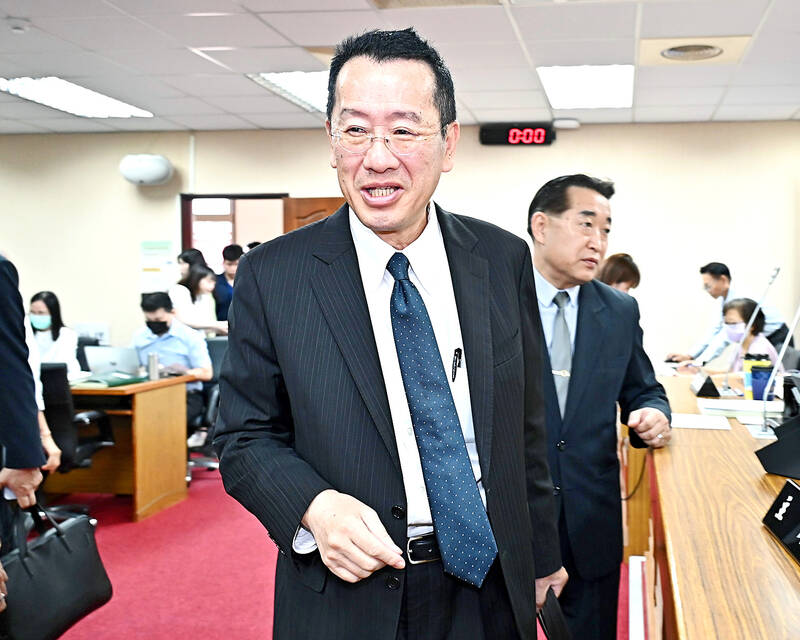Minister of National Defense Wellington Koo (顧立雄) yesterday said next month’s Han Kuang military exercises would involve the largest ever mobilization of reservists for the annual drills, which are being extended to improve the Taiwan’s response to “gray zone” harassment by China.
The Han Kuang exercises, which the defense ministry said would be held from July 9 to 18, are conducted every year across Taiwan to train its armed forces as China ramps up military pressure on the nation.
Koo yesterday told the Legislative Yuan that as many as 22,000 reservists would be called up to take part in the exercises, up from 14,647 last year.

Photo: Tu Chien-jung, Taipei Times
“Our main objective is to verify how much time it takes for a reserve brigade to regain full combat capability after being called up,” Koo said.
Taiwan maintains a standing call-up system to train its reservists, and the mobilization this year would be expanded as part of the annual military drills.
The Ministry of National Defense said the annual drills would be extended to 10 days and nine nights, compared with five days and four nights last year.
Koo said the most significant change would be the inclusion of “gray zone harassment” scenarios, simulating a military escalation based on “regional developments.”
Taiwan accuses China of using “gray zone” tactics — actions that fall short of an act of war — to weaken its defenses.
Beijing regularly deploys fighter jets, warships and coast guard ships near Taiwan, and has held several major military exercises around the nation over the past few years.
The Taiwan reservists called up would undergo a full 14-day training program, 10 days of which would be dedicated to participation in the drills.
In March, the ministry said it would simulate possible scenarios for a Chinese invasion in 2027 during Han Kuang drills.
In related news, Taiwan would issue new air-raid guidance for citizens next week, learning lessons from Ukraine and Israel in case it needs to counter a Chinese military attack, according to security officials and internal planning documents reviewed by Reuters.
“Taiwan is looking very closely into the cases from Ukraine and Israel,” a senior security official briefed on the matter said.
“Our people must know how to protect themselves, either at home or in office,” said the official, who requested anonymity due to the sensitivity of the matter.
Authorities would update instructions on what people should do when air-raid alerts are issued, including for citizens who are not able to get into shelters in time or for those who are driving a car, according to the government planning documents.
That includes instructions on hiding behind “at least two layers of walls” and “staying in the down position while opening your mouth slightly” in a scenario when people could not immediately get to an air-raid shelter.
“In metropolitan Taiwan, the reality is that many residents of high-rise buildings may not be able to get to the designated air-raid shelters quickly within three minutes,” a second security official said, adding that the government is working to get citizens to learn “alternative” ways to protect themselves.
Civil defense drills including rehearsals on setting up emergency supply stations would be held across the nation alongside the Han Kuang military exercises, the two officials said.
Taiwan has been preparing air-raid shelters across the nation, including in subway stations and shopping malls, after Russia’s invasion of Ukraine raised new fears about a Chinese invasion.
Taipei alone has more than 4,600 such shelters that can accommodate about 12 million people, more than four times its population.

Taiwanese can file complaints with the Tourism Administration to report travel agencies if their activities caused termination of a person’s citizenship, Mainland Affairs Council Minister Chiu Chui-cheng (邱垂正) said yesterday, after a podcaster highlighted a case in which a person’s citizenship was canceled for receiving a single-use Chinese passport to enter Russia. The council is aware of incidents in which people who signed up through Chinese travel agencies for tours of Russia were told they could obtain Russian visas and fast-track border clearance, Chiu told reporters on the sidelines of an event in Taipei. However, the travel agencies actually applied

Japanese footwear brand Onitsuka Tiger today issued a public apology and said it has suspended an employee amid allegations that the staff member discriminated against a Vietnamese customer at its Taipei 101 store. Posting on the social media platform Threads yesterday, a user said that an employee at the store said that “those shoes are very expensive” when her friend, who is a migrant worker from Vietnam, asked for assistance. The employee then ignored her until she asked again, to which she replied: "We don't have a size 37." The post had amassed nearly 26,000 likes and 916 comments as of this

New measures aimed at making Taiwan more attractive to foreign professionals came into effect this month, the National Development Council said yesterday. Among the changes, international students at Taiwanese universities would be able to work in Taiwan without a work permit in the two years after they graduate, explainer materials provided by the council said. In addition, foreign nationals who graduated from one of the world’s top 200 universities within the past five years can also apply for a two-year open work permit. Previously, those graduates would have needed to apply for a work permit using point-based criteria or have a Taiwanese company

The Shilin District Prosecutors’ Office yesterday indicted two Taiwanese and issued a wanted notice for Pete Liu (劉作虎), founder of Shenzhen-based smartphone manufacturer OnePlus Technology Co (萬普拉斯科技), for allegedly contravening the Act Governing Relations Between the People of the Taiwan Area and the Mainland Area (臺灣地區與大陸地區人民關係條例) by poaching 70 engineers in Taiwan. Liu allegedly traveled to Taiwan at the end of 2014 and met with a Taiwanese man surnamed Lin (林) to discuss establishing a mobile software research and development (R&D) team in Taiwan, prosecutors said. Without approval from the government, Lin, following Liu’s instructions, recruited more than 70 software